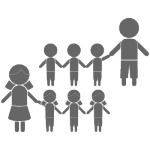WHAT IS MENTORING?
Mentoring is a committed relationship between an adult and a youth focused on developing the character and capabilities of the young person. Mentors are supportive individuals who build relationships with young people by offering them guidance, support, and encouragement to help cultivate positive and healthy development. Mentors are not meant to replace parents, guardians, or teachers, or to play the role of disciplinarians or decision makers. Rather, they become part of a team of caring adults to that young person. Mentors can help encourage positive choices, promote high self-esteem, support academic achievement and introduce new ideas. Here are some things a mentor might help a young person with:
- Setting academic and/or career goals and taking steps to achieve them
- Making healthy choices in everyday life like nutrition, exercise, social activities, and beyond
- Thinking through a problem at home or school
WHAT CAN I EXPECT FROM A QUALITY MENTORING PROGRAM?
Research suggests that quality mentoring programs implement nationally recognized best practice standards based on research, experience, and evidence of positive outcomes. Read more about how MENTOR Nebraska supports quality mentoring.
WHAT ARE QUALITIES OF A GOOD MENTOR?
Before becoming a mentor, here are a few things to understand about the role of mentoring. Most of us have had a teacher, supervisor, or coach who has been a mentor to us and made a positive difference in our lives. Those people wore many hats, acting as role models, cheerleaders, policy enforcers, advocates, and friends. Mentors assume these different roles during the course of a relationship and share some basic qualities:
- A sincere desire to be involved with a young person
- Respect for young people
- Active listening skills
- Empathy
- Ability to see solutions and opportunities
- Flexibility
WHAT DO MENTORS DO WITH YOUTH?
Mentors and youth may decide together what they want to do when they meet. Activities could include playing sports, learning to cook something new, going on a walk, or checking out a free event in the community.
For structured mentoring programs such as school or group-based programs, guidelines for meeting times and activities are laid out by the program.
WHY SHOULD I MENTOR?
MENTOR Nebraska believes all children have the potential to succeed in life and contribute to society, but not all children get the support they need to thrive. There are thousands of youth in Nebraska who could benefit from a positive mentoring relationship. Most mentoring programs have a waiting list of youth who want to be matched with a mentor.
Mentoring, at its core, guarantees young people that there is someone who cares about them, assures them they are not alone in dealing with day-to-day challenges, and makes them feel like they matter. Research confirms that quality mentoring relationships have powerful positive effects on young people in a variety of personal, academic, and professional situations. Ultimately, mentoring connects a young person to personal growth and development, and social and economic opportunity. Yet one in three young people will grow up without this critical asset.
HOW DO YOUTH AND MENTORS BENEFIT FROM MENTORING?
Mentoring relationships are a shared opportunity for learning and growth. Many mentors say that the rewards they gain are as substantial as those for their mentees, and that mentoring has enabled them to:
- Have fun
- Achieve personal growth and learn more about themselves
- Improve their self-esteem and feel they are making a difference
- Gain a better understanding of other cultures and develop a greater appreciation for diversity
- Feel more productive and have a better attitude at work
- Enhance their relationships with their own children
- Above all, a good mentor is willing to take the time to get to know their mentee, to learn new things that are important to the young person, and even to be changed by their relationship.
WHAT ARE THE DIFFERENT TYPES OF MENTORING?
Mentoring experiences come in all kinds of shapes and sizes. The most common types of mentoring include:
- One to one mentoring - One adult mentors with one young person

- Group mentoring - One adult mentors up to four young people

- Team mentoring - Two or more adults mentor a group of young people

- Peer mentoring – One young person mentors another young person

- Big Couple mentoring - Adult couple mentors one young person

- Community-based mentoring – Mentoring matches meet at any location of their choice within the community

- School & Site-based mentoring – Mentoring matches meet in a school setting or at a site predetermined by the mentoring program

WHAT IS THE TIME COMMITMENT?
Depending on the program you choose to volunteer with, the time commitment varies. Community-based programs typically ask volunteers to meet 4 hours a month for at least a year to develop the relationship. School-based programs meet on-site during the school calendar year.
CAN I EXPECT TO SEE IMMEDIATE RESULTS?
Like many things in life, patience is a virtue in mentoring! Often, a mentor eagerly wants to observe dramatic results in a short period of time, but it takes time to see positive results. It is important to remember that no matter what the immediate outcomes are, your time and presence in a young person’s life make a difference because it shows them that they are a valued member of the community.
